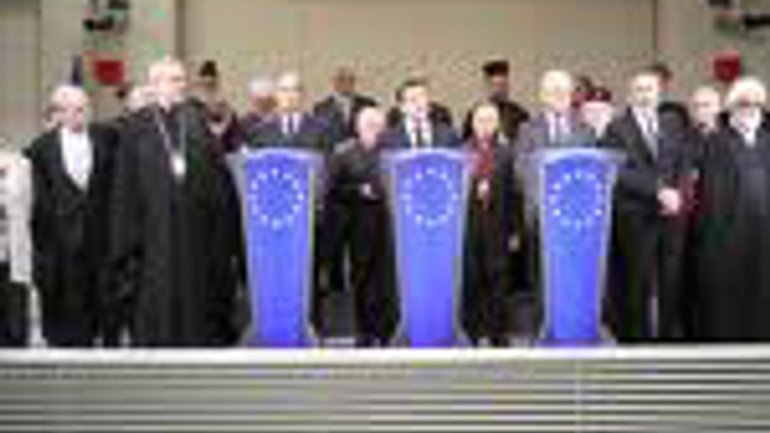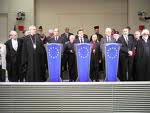European Council of Religious Leaders Annual Meeting Addresses Justice, Equality and Sharing

 The European Council of Religious Leaders - Religions for Peace annual meeting opened in Istanbul, Turkey, on Monday 26 April 2010. The meeting lasts until Wednesday and the main theme is “At the Crossroads: Justice, Equality and Sharing as a Basis for Cultures of Peace”. So reported the Ecumenical Comittee of the Ukrainian Greek Catholic Church.
The European Council of Religious Leaders - Religions for Peace annual meeting opened in Istanbul, Turkey, on Monday 26 April 2010. The meeting lasts until Wednesday and the main theme is “At the Crossroads: Justice, Equality and Sharing as a Basis for Cultures of Peace”. So reported the Ecumenical Comittee of the Ukrainian Greek Catholic Church.
Dr A Hadi Adanali, the adviser to the Turkish Prime Minister on intercultural affairs, gave the key note address in the opening session of the meeting. He presented the Turkish government’s initiatives linked to the Alliance of Civilisation process; “The first decade of the 21st century has seen a growing recognition of the role of religion in the meeting of cultures,” he said, and also emphasised the necessity in our time for religious leaders to understand and interact with youth culture.
In his report to the council, ECRL Moderator Bishop Gunnar Stålsett, placed the work of the council within the context or present day challenges for religions in Europe:
“Our agenda emerges from the confluence of social and cultural challenges in our continent. As people of faith we are not set apart from each other, nor separated from the ills of humanity. Ours is a dialogue of creeds translated into a dialogue of deeds.
Again and again we are faced with the discrepancy between our words and our actions. Our divinely inspired call for the dignity of every human being is often muted by the dissonant voice of institutional and individual practice. Every day we are humbled by the distortion from within of our institutions.
The days of triumphalism in the name of any single religion are over. No one is above critical scrutiny of the media. No one can ignore the critical voice of conscience, as often articulated from believers as from non-believers. Faced with our own shortcomings, we seek comfort in words of forgiveness and acts of contrition.”
On Tuesday morning Dr Doudou Diene, former UN Special Rapporteur on Contemporary Forms of Racism, Racial Discrimination, Xenophobia and related Intolerance addressed the theme “Justice – African Poverty and European Migration – Global Challenges for Religions”, and in the afternoon the council examined the issue
“Equality – More equal than others? Minarets, minorities and European identity”. On Wednesday the council will discuss a process to develop a universal code on holy sites.
The meeting in Istanbul is hosted by the President of Religious Affairs in Turkey, Dr Ali Bardakoglu who is also an ECRL member. Among the other 30 participants are Grand Mufti Dr Mustafa Ceric (Bosnia-Herzegovina), Rabbi Aba Dunner (UK), Sister Marian Murcia (Italy), Bhai Saheeb Mohinder Singh (UK), and Father Philip Ryabykh (Russia) representing Metropolitan Hilarion.
On Wednesday 28 April ECRL concluded its annual meeting in Istanbul and issued the Istanbul Declaration on Tolerance: Our Commitment to Justice, Equality and Sharing which also reflects the meeting’s main theme.
“Tolerance is an active recognition of diversity and means respecting the otherness of the other with whom we differ religiously, culturally, or otherwise, with compassion and benevolence. Tolerance does not mean unconditional approval of the ideas of others nor of the way they live their lives. Tolerance means respecting the other’s human rights, but not necessarily sharing his or her viewpoints.”
The council members found that taken in this comprehensive sense, tolerance should be nourished as it is a precondition for a culture of peace in Europe. The council found that this understanding of tolerance naturally grows out of their religious traditions.
The Istanbul Declaration contains eight specific points in which the religious leaders commit themselves to working to promote religious freedom and mutual respect as well as “to engage in self-critical scrutiny” in order to counter intolerance.
The declaration was inspired by a discussion on the theme: “Equality – More equal than others? Minarets, minorities and European identity” which revealed a shared understanding that Europe is and always has been a multicultural and multireligious continent. On the issue of the Swiss ban on minarets one presenter observed that “instead of attacking extremism and terrorism, Europe attacks its own heritage, the very presence of Muslims in Europe”. The discussion further addressed anti-semitism as a growing problem in Europe at the moment. Some members pointed out that even Christians, the traditional majority in most European countries, can experience hateful attacks.
On Wednesday the council examined a process to develop a universal code on holy sites in which Religions for Peace is playing a central role. The process involves religious leaders from Europe and the Middle East, and was endorsed by the council.
After the meeting a delegation from ECRL had an audience with HH the Ecumenical Patriarch Bartholomew where they shared their tolerance declaration..
You may read the Istanbul Declaration on Tolerance: Our Commitment on Justice, Equality and Sharing here.
The meeting in Istanbul is hosted by the President of Religious Affairs in Turkey, Dr Ali Bardakoglu who is also an ECRL member. Among the other 30 participants are Grand Mufti Dr Mustafa Ceric (Bosnia-Herzegovina), Chief Rabbi Pinchas Goldschmidt (Russia), Sister Marian Murcia (Italy), Metropolitan Emmanuel (France), Bhai Saheeb Mohinder Singh (UK), and Father Philip Ryabykh (Russia) representing Metropolitan Hilarion.
The European Council of Religious Leaders is one of four regional Inter- Religious Councils (IRCs) within the World Conference of Religions for Peace (WCRP) network. The European Council of Religious Leaders brings together senior religious leaders from Europe’s historical religions: Judaism, Christianity and Islam, with Buddhists, Hindus, Sikhs and Zoroastrians as active participants.
The Council, which has 30 members, was founded in Oslo in 2002. The Council is funded by its members and has received project support from The Norwegian Ministry of Foreign Affairs. Religions for Peace (WCRP) is a network of national and regional Inter-Religious Councils (IRC) connected through an international World Council and Secretariat, based opposite the UN Headquarters in New York. The global organisation brings together 51 national and 4 regional IRCs.









